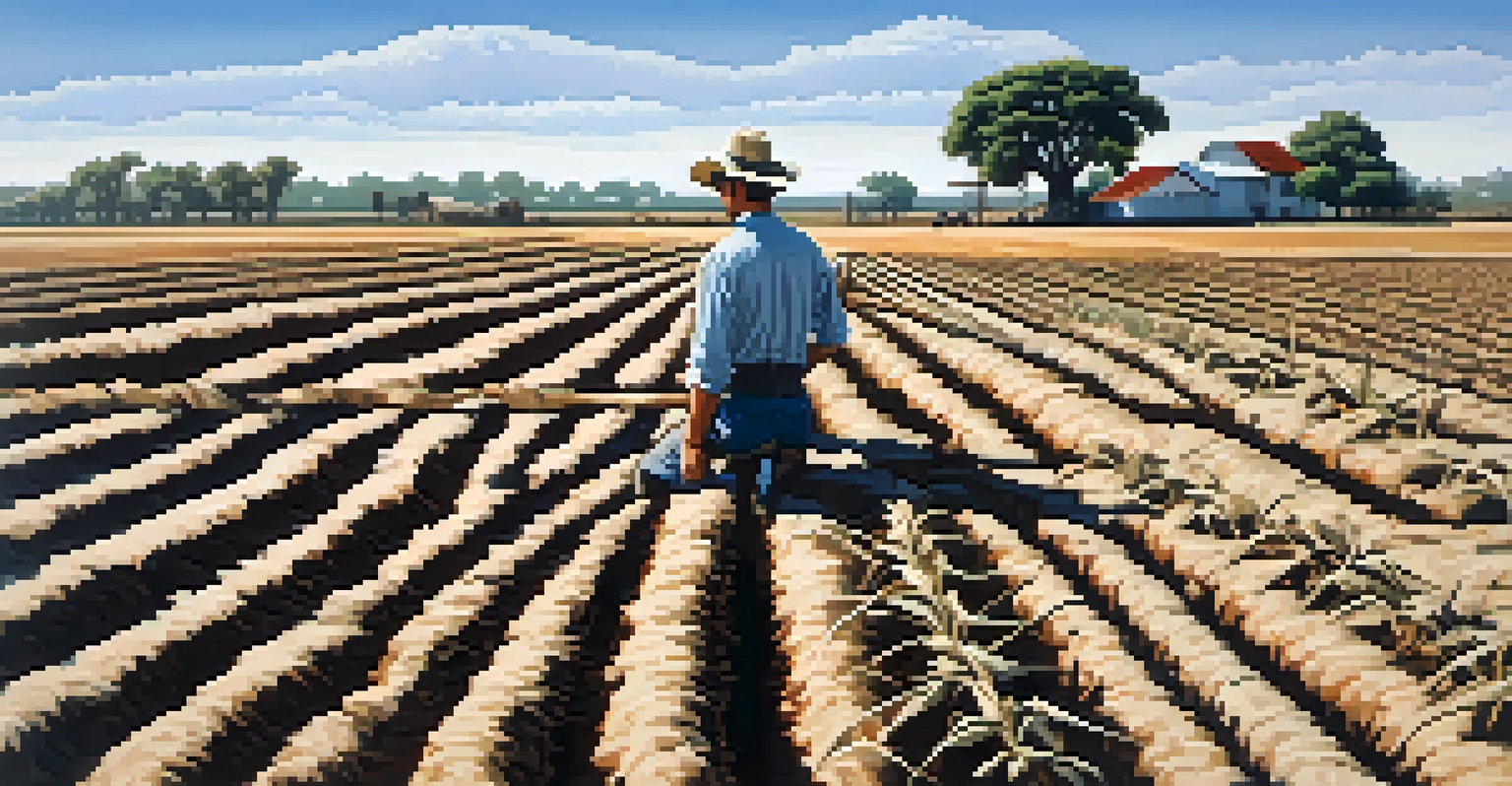Impact of Climate Change on Florida's Agriculture and Economy

Overview of Florida's Agriculture Landscape
Florida is a major agricultural hub in the United States, known for its diverse crops such as oranges, sugarcane, and tomatoes. The state's warm climate and fertile soil create ideal conditions for year-round farming. Agriculture contributes significantly to Florida's economy, employing thousands and generating billions in revenue.
Agriculture is the foundation of our economy, and we must adapt to ensure its sustainability in the face of climate change.
However, this vital sector is increasingly vulnerable to climate change, which brings unpredictable weather patterns. Rising temperatures, altered rainfall, and extreme weather events threaten crop yields and farmer livelihoods. Understanding this landscape is crucial for grasping the potential impacts of climate change on Florida's agriculture.
As shifts in climate begin to take hold, farmers are faced with the pressing challenge of adapting their practices. From changing planting schedules to adopting new irrigation techniques, the agricultural community must remain resilient to protect their crops and maintain economic stability.
Effects of Rising Temperatures on Crop Production
Rising temperatures are one of the most immediate impacts of climate change affecting Florida's agriculture. Many crops, particularly fruits like oranges, thrive in specific temperature ranges. As temperatures climb, these crops may struggle to grow and produce at optimal levels, leading to lower yields.

For instance, an increase of just a few degrees can make a significant difference in fruit quality and quantity. Furthermore, heat stress can affect pollinators, which are essential for the reproduction of many crops. This cascading effect poses a serious threat to Florida's agricultural output.
Climate Change Threatens Crop Yields
Rising temperatures and extreme weather patterns pose significant challenges to crop production in Florida, impacting both quality and quantity.
Farmers are now exploring heat-resistant crop varieties and innovative farming techniques to mitigate these effects. However, adaptation requires investment, which can be a hurdle for many small-scale farmers. Addressing these challenges is key to sustaining Florida's agricultural economy.
The Impact of Drought and Water Scarcity
Drought and water scarcity are growing concerns as climate change alters precipitation patterns in Florida. Agriculture relies heavily on consistent rainfall and water availability for irrigation. Prolonged dry spells can lead to severe crop stress and lower productivity.
The greatest threat to our planet is the belief that someone else will save it.
In Florida, drought can impact not only farmers but also the overall economy. Reduced crop yields can lead to higher prices for consumers and diminished income for farmers. This cycle can also threaten food security, especially in regions heavily dependent on local agriculture.
To combat these challenges, many farmers are adopting water-efficient irrigation systems and crop management practices. However, the ongoing threat of drought emphasizes the need for sustainable water management practices to protect both agricultural productivity and Florida's economy.
Flooding and its Consequences on Agriculture
On the flip side, climate change also increases the frequency and intensity of flooding in Florida. Heavy rainfall can lead to waterlogged fields, making it difficult for farmers to plant and harvest their crops. This not only disrupts production but can also damage crops beyond recovery.
For example, flooding can lead to soil erosion, nutrient leaching, and the spread of pests and diseases. These factors can diminish soil health and long-term agricultural viability. Furthermore, flooded fields can delay planting times, leading to shorter growing seasons.
Drought and Flooding Impact Farmers
Inconsistent rainfall leads to water scarcity and flooding, creating economic pressures for farmers while threatening food security.
Farmers are now investing in better drainage systems and crop rotation practices to mitigate flooding's effects. However, the unpredictability of weather patterns continues to strain their ability to plan effectively, highlighting the urgent need for adaptive strategies in agriculture.
Economic Implications for Farmers and Communities
The economic implications of climate change on Florida's agriculture extend far beyond the farm gate. As crop yields fluctuate due to changing climate conditions, farmers face increased financial uncertainty. This can lead to higher prices for consumers and a strained local economy, especially in rural areas reliant on agriculture.
Moreover, with the threat of crop loss, farmers may need to invest in insurance and other risk management strategies, further increasing operational costs. These financial pressures can lead to difficult decisions about which crops to plant and how to manage resources effectively.
Communities that depend on agriculture for their livelihood must also adapt to these economic shifts. Local businesses that support farming operations, such as equipment suppliers and food processors, may also feel the impact, creating a ripple effect throughout the economy.
Adapting Agricultural Practices to Climate Change
Adapting agricultural practices is essential for Florida's farmers to cope with the effects of climate change. This includes implementing sustainable farming techniques, such as crop rotation, cover cropping, and integrated pest management. These practices not only enhance soil health but also promote resilience against climate-related challenges.
Moreover, embracing technology can play a significant role in adaptation. Innovations like precision agriculture allow farmers to optimize resource use and monitor crop health more effectively. By leveraging data-driven insights, farmers can make informed decisions that improve their adaptability to changing conditions.
Adaptation Strategies Are Essential
Farmers must adopt sustainable practices and innovative technologies to adapt to climate change and ensure the resilience of Florida's agriculture.
Education and support from agricultural extension services are also vital in this adaptation process. Providing farmers with access to research, training, and resources can empower them to adopt new practices and technologies, ultimately helping to secure the future of Florida's agriculture.
The Role of Policy and Community Support
Effective policy and community support are critical in addressing the impacts of climate change on Florida's agriculture. Policymakers can play a pivotal role by creating incentives for sustainable practices, funding research, and providing resources for farmers. This collaborative approach can significantly enhance agricultural resilience.
Furthermore, community engagement is essential for fostering a collective response to climate-related challenges. Farmers, local organizations, and consumers can come together to promote awareness and advocate for policies that support sustainable agriculture and climate adaptation.

By building a strong network of support, Florida can better equip its agricultural sector to face the challenges posed by climate change. This commitment to collaboration will not only protect farmers but also ensure a stable and sustainable food supply for future generations.
Conclusion: Looking to the Future of Agriculture
The impact of climate change on Florida's agriculture and economy underscores the need for proactive measures. As temperatures rise and weather patterns shift, farmers must navigate a new agricultural landscape filled with both challenges and opportunities. The resilience of Florida's agricultural sector will depend on its ability to adapt and innovate.
Embracing sustainable practices and leveraging technology can help mitigate some of the adverse effects of climate change. However, this requires a collective effort from farmers, policymakers, and communities alike to foster an environment that supports adaptation and growth.
As we look to the future, it's clear that understanding and addressing the impacts of climate change is essential for safeguarding Florida's agriculture and ensuring a robust economy. With determination and collaboration, Florida can continue to thrive as a leading agricultural state in the face of climate challenges.